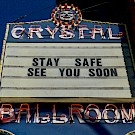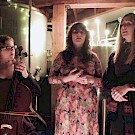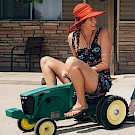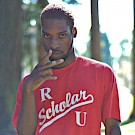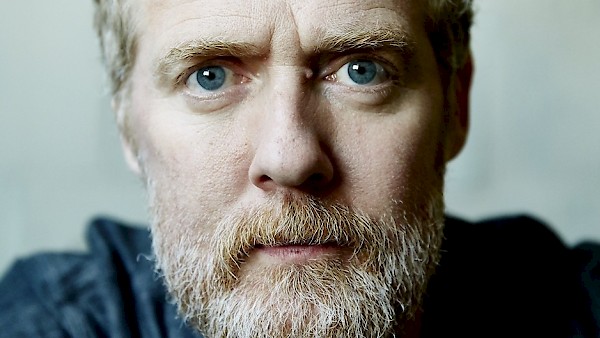 As Eddie Vedder’s opening act in 2011, Glen Hansard was nothing short of revelatory. Accompanied only by his talismanic Takamine acoustic, the Irish singer-songwriter tore through a set of such searing passion and emotional ferocity that the standing ovation from a sold-out crowd at the Schnitzer ushering him off stage was likely as much a demand for an encore as it was an act of sincere appreciation. It was perhaps such a reception that led Vedder to twice recall Hansard, for “Society” and then for “Falling Slowly,” the Oscar-winning ballad Hansard penned with Swell Season counterpart and then-lover Marketa Irglova.
As Eddie Vedder’s opening act in 2011, Glen Hansard was nothing short of revelatory. Accompanied only by his talismanic Takamine acoustic, the Irish singer-songwriter tore through a set of such searing passion and emotional ferocity that the standing ovation from a sold-out crowd at the Schnitzer ushering him off stage was likely as much a demand for an encore as it was an act of sincere appreciation. It was perhaps such a reception that led Vedder to twice recall Hansard, for “Society” and then for “Falling Slowly,” the Oscar-winning ballad Hansard penned with Swell Season counterpart and then-lover Marketa Irglova.
On Friday, November 13, Hansard returned to the Rose City—this time fronting an eight-piece band before a capacity crowd at the Crystal Ballroom—and worked his way through a more contemplative and ruminating set list drawn from the relative expanse of his recorded discography, including selections from his latest release, Didn’t He Ramble. This time, the evening began on a more restrained note, as Hansard quietly emerged from backstage and seated himself before an upright piano to open with “The Storm, It’s Coming,” a solemn, portentous number from 2012’s Rhythm and Repose. Hansard’s ensuing selections, including “Just To Be The One” and “Winning Streak,” would hew closely to this aesthetic, with the latter enlivened by the tasteful, well-situated accompaniment of horn and string sections.
While perhaps attributable to the arcing, gradual qualities of a headliner’s set, the ominous premonition and poignant disquietude of the introductory pieces were undoubtedly facets of Hansard’s struggle to come to terms with the wave of horrific violence that consumed Paris mere hours earlier. In fact, Hansard would later announce that his group, who had performed at La Cigale in late September, had been effectively unable to soundcheck during the afternoon on account of the draining emotional trauma wrought by news of the attacks.
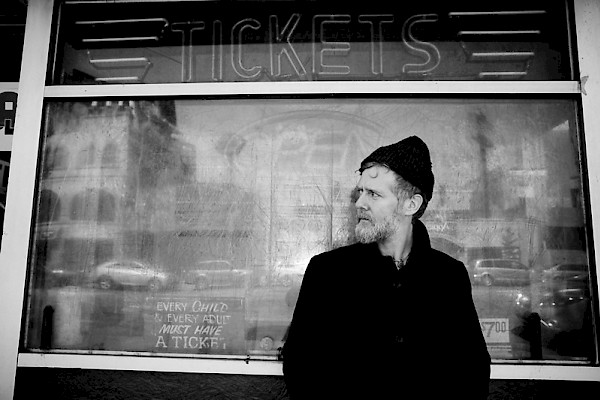 The evening would not lack for lighter moments, however, as—in typical fashion—Hansard gently mocked the absurdity of a $350 work shirt (we’re looking at you, Steven Alan, with your storefront just down the block) prior to “My Little Ruin,” and playfully quoted Kraftwerk’s “Autobahn” during the introductory phrases of “Talking With The Wolves.” Nevertheless, Hansard’s thoughtful reflections on Paris and his call for audience empowerment and support would be the key moment of the night. The unburdening of his conscience on the subject established a firmer symbiosis with concertgoers and seemed to clear space for the bare earnestness and expressive power that make him such a compelling performer.
The evening would not lack for lighter moments, however, as—in typical fashion—Hansard gently mocked the absurdity of a $350 work shirt (we’re looking at you, Steven Alan, with your storefront just down the block) prior to “My Little Ruin,” and playfully quoted Kraftwerk’s “Autobahn” during the introductory phrases of “Talking With The Wolves.” Nevertheless, Hansard’s thoughtful reflections on Paris and his call for audience empowerment and support would be the key moment of the night. The unburdening of his conscience on the subject established a firmer symbiosis with concertgoers and seemed to clear space for the bare earnestness and expressive power that make him such a compelling performer.
Playing with renewed vigor, Hansard and his band locked in on “Way Back In The Way Back When,” which included a timely nod to Ringo Starr’s kick-drum fill from “Come Together,” before closing the set with an elongated arrangement of “The Gift.” As the band stretched out the song’s final chord changes for an extended jam, Hansard was nearly doubled over as if to conjure its visceral, emotive qualities and project them to every corner of the room—and, in the process, he perhaps mirrored the very best of his own.
By the time Hansard and his guitarist cleverly sneaked to the back of the venue to perform “Say It To Me Now” from the balcony corner before retaking the stage for “Falling Slowly,” the forceful delivery, conviction and sincerity that fueled his magnificent 2011 appearance with Vedder were laid bare. While showcasing the strength of the material on Didn’t He Ramble and the supportive talents of an attentive backing band, who nicely accentuated and never overwhelmed the delicacy of his songs, Hansard’s Friday performance was, most importantly, another forceful case for the primacy of the human element in art—a pure, unmitigated treatment of the joyous and tragic aspects of experience and the timeless potency of their expression through music.

